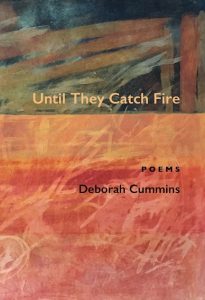Until They Catch Fire
Until They Catch Fire, Poems, by Deborah Cummins.
Deerbrook Editions, 2020,
82 pages, paper, $18,
ISBN: 978–1–7343884–5–9.
Deborah Cummins’ third book of poems opens with a stunner. “So It Happens” offers a re–imagining of Eve in Eden in which the first woman falls into rather than from desire, “Not succumbing / but choosing.” The writing is superlative; here’s a stanza describing the pre–classified garden world:
No name yet for summer rain,
shadows among the clamoring leaves,
the plunge of bees purposeful in the lilies.
The rest of Until They Catch Fire is equally engaging and well-wrought — and emotionally charged. Nearly half the poems are devoted to the poet’s reflections on the deaths of her brother and mother, each the occasion for remembrance and regret, but also bittersweet celebration.
The grief is approached from a variety of angles, with poems prompted by a last photo, a medical examiner’s report, cleaning out a closet and dresser. Cummins covers the emotional spectrum, from anger to despair and dread. In “After, I might’ve said,” she reflects on how she might have reacted to death, by giving up on her gardening, letting everything go, “Applaud nits, aphids, cutworms, borers.” Another poem offers a “griever’s reference manual” with such bits of wisdom as “Vow never to tell anyone, ‘Time will heal.’”
Some poems are just plain beautiful in their carriage. “Where’s Your Hammer, Dad?” is an extended plea to a widowed father who has given up his daily projects to sit and stare. “For God’s sake,” the speaker says at the end, “doesn’t something need to be fixed?” And “Breakfast Geometry” belongs in an anthology of best grandchild poems. These lines resonate:
She’s years away from knowing
that it helps to lie down in the darkness
with someone who knows how to love
and laugh.
The language throughout is fresh and precise. A couple of flora related examples: “shrubs so clipped they threatened the notion of severe” (“14938 Oakdale Avenue”); “Dogwoods merely stutter / with a few final berries” (“Mid–November”); “the frothed collapse / of a flowering crabapple” (“The Dead”).
And there’s humor, at times of an edgy sort. In “Hair Rollers,” Cummins describes her mother’s curling tools: “Rigid, bristled, held with numerous / pins and clips, they looked like a means of torture / awaiting an electrical switch.” In the madcap “At the Grocery Store,” a couple strategically attacks the aisles, the wife at one point maneuvering into “regiments of whole grain cereals, / of couscous and quinoa, new heroes / despite their stunning resemblance to birdseed.”
Echoes of poets past enrich the verse. W. H. Auden’s “Musée des Beaux–Arts” is the source for the intense “On the Morning Of ” in which the brother being wheeled to the crematorium becomes Icarus falling into the sea. “Illumination,” an account of visiting Sant’ Eufemia in Rome, brings to mind Larkin’s “Church Going” while these lines from the love poem “Trying to Tell Us” recall Yeats’s image of the heart “fastened to a dying animal”:
For those of us discovering late
who and what we love, there is no reprieve
from how the body betrays us.
Cummins occasionally slips into a descriptive, prosy mode, as in “On an Encore Trip to Rome” or the ambitious five–part “Windows” where narrative takes over. A couple of poems stretch an analogy or conceit: “If a House Had Eyes” gets a little too anthropomorphic for this reader.
These are minor gripes. Until They Catch Fire is overall a brilliant collection, in turn intimate and universal, full of insight and intelligence. Open it and be moved.
— Carl Little


